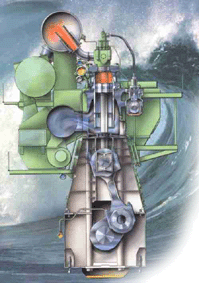DEPARTMENT MARINE ENGEINEERING

The speciality of Marine Engineering was introduced in 1963, the first year of enrollment of students in the Higher Institute of Mechanical and Electrical Engineering, Varna, now Technical University-Varna.
The duration of study is 4 years for full-time students and extramural students, including six months of engineering practice (including onboard training or experience in onshore industry). Students graduate with a degree "Bachelor" with professional qualification "Engineer of ship's machines and mechanisms at operational level" and the opportunity to obtain an internationally recognized license "watchkeeping engineer". Graduates degree "Bachelor" on Marine Engineering can continue their studies in degree "Master" to obtain a professional qualification "Engineer of ship machines and mechanisms at management level" degree "Master Engineer" and the opportunity to acquire capacity "Marine Engineer unlimited power "or" Marine Engineer I-st degree - Chief Engineer".
The specialized training of students is provided by the Department of Marine Engineering which is part of the Faculty of Shipbuilding of TU-Varna, the only faculty in the civilian universities in the country specialized in Marine Engineering. The Department of Marine Engineering has a long tradition in training engineers in the speciality of Marine Engineering. During their studies at the Technical University of Varna, students in Marine Engineering acquire profound engineering knowledge of thermodynamics, engineering mechanics, the use of computer equipment, marine diesel engines, steam generators, steam and gas turbines, ship power plants, auxiliary machinery, mechanisms and systems, air conditioning and refrigeration systems, ship automation, the ship's electrical equipment, production technology, of ship machinery installation and repairs, ship power plant testing, ship machinery vibration and diagnostics, design, engineering and technology automation, operation and maintenance of ship machinery and equipment.
Students gain practical knowledge and skills in turnery, locksmiths, welding and maintenance of marine equipment. Main part of practical training of students is conducted in "Engine Room Simulator" training centre of Marine Engineering Department in TU-Varna.
Curricula and programmes in Marine Engineering meet the requirements of the International Maritime Organisation (IMO) for seafarers' competence STCW78 and are consistent with the Executive Agency “Maritime Administration (EAMA).
Throughout the whole course of their university education, the students in Marine Engineering study English, General English being taught in the first 5 semesters and the next 4 semesters being devoted to specialized English for Marine Engineers. At the end of their course, students have a state exam in English which comply with the requirements of EAMA and the relevant international standards. English classes aim at developing students' vocabulary in specialized terminology and familiarizing them with the most common clichés and technical abbreviations in Maritime English. The training focuses on basic language skills, with a special emphasis laid on reading comprehension, translation and productive skills (figure description, dealing with technical documentation). Particular attention is paid to the development of students’ communication skills in order to ensure a successful future engineering career in an international environment.
|
The primary duties of the Marine Engineers with a Master of Engineering Degree include the following:
The graduates in Marine Engineering can apply their engineering knowledge as:
|
 |

